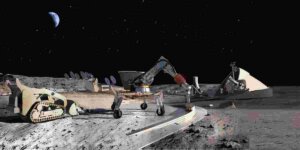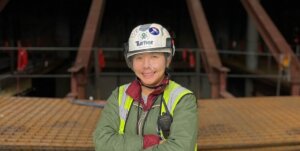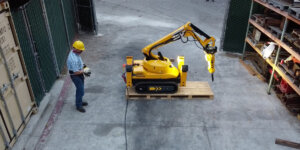ISI researcher Behrokh Khoshnevis has received a grant from the Annenberg Foundation to support intensified research on Contour Crafting, an innovative robotic construction technology that promises to reconstruct areas destroyed in tsunamis, hurricanes, earthquakes or other disasters in weeks rather than months or years.
Because of this support, Khoshnevis is optimistic that his team will be able to demonstrate a full-scale prototype in 2006, as tangible proof of a process that promises swift new shelter to the multitudes worldwide that are left homeless due to natural disasters or war each year.
“I want to thank the Annenberg Foundation for its support and vision in helping to pave the way for valuable and enduring global rehabilitation,” said Khoshnevis (left).
“In addition to providing a solution for millions of low income families and victims of natural disasters, Contour Crafting has the potential to reduce the number of workers seriously injured or killed in the course of construction projects in the United States.”
Khoshnevis is an expert on so-called rapid prototyping systems, which “print out” three -dimensional objects by building them up in thin layers. Two years ago, with funding from the National Science Foundation, Khoshnevis began work on a way to up-size the process to construct houses and other structures.
Khoshnevis’ existing Contour Crafting machine extrudes concrete or other liquid building material much the way toothpaste comes out of a tube, molding the material with trowels as it exits a nozzle. Mounted on a crane or gantry, the machine continuously circles the site, laying down layer after layer.
The system creates the foundation and structural skeleton as it builds, leaving space for plumbing and electrical conduits. Khoshnevis says it should be able to build a full-scale 2,000 square-foot house in one day, rather than in six months or more.
“The machine works without blueprints, proceeding directly from the CAD-CAM computer drafting systems widely used by architects today,” said Khoshnevis. “What the architect designs, the robotic arm creates.”
Khoshnevis believes Contour Crafting “will enable the construction of custom-designed, low-cost housing with a level of quality considered unachievable in such a limited or concentrated timeframe.” Contour Crafting is also being evaluated by NASA as a potential building system for the moon or Mars.
Khoshnevis is a professor in the USC Viterbi School of Engineering working at the Viterbi School’s Information Sciences Institute. He created the system recalling tragic earthquake damage he observed in his native Iran during the early 1990s.
About the Annenberg Foundation:
The Annenberg Foundation exists to advance the public well-being through improved communication. As the principal means of achieving its goal, the Foundation encourages the development of more effective ways to share ideas and knowledge. The Annenberg Foundation has offices in Radnor, PA and Los Angeles, CA.
Published on November 17th, 2005
Last updated on August 9th, 2021












